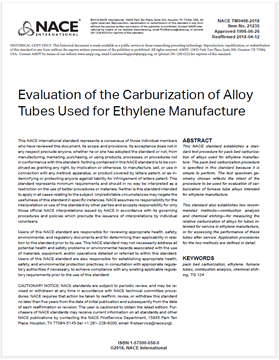Search
Products tagged with 'test methods'
View as
Sort by
Display
per page
TM0374-1990, Laboratory Screening Tests to Determine the Ability of Scale Inhibitors to Prevent the Precipitation of Calcium Sulfate and Calcuim Carbonate From Solution (For Oil and Gas Production Systems)
Product Number:
53023-HD1990
Publication Date:
1990
$179.00
TM0374-2016-SG, Laboratory Screening Tests to Determine the Ability of Scale Inhibitors to Prevent the Precipitation of Calcium Sulfate and Calcium Carbonate from Solution (for Oil and Gas Production Systems)
Product Number:
21208-SG
ISBN:
1-57590-124-2
Publication Date:
2016
$109.00
TM0397-2018-SG “Screening Tests for Evaluating the Effectiveness of Gypsum Scale Removers”
Product Number:
21230-SG
ISBN:
1-57590-044-0
Publication Date:
2018
$109.00
TM0397-HD2002-SG Screening Tests for Evaluating the Effectiveness of Gypsum Scale Removers-HD2002
Product Number:
21230-HD2002
ISBN:
1-57590-044-0
Publication Date:
2002
$179.00
TM0397-HD2012-SG, Screening Tests for Evaluating the Effectiveness of Gypsum Scale Removers
Product Number:
21230-HD2012
ISBN:
1-57590-044-0
Publication Date:
2012
$179.00
TM0398-HD1998-SG Laboratory Corrosion Testing of Metals in Static Chemical Cleaning Solutions at Temperatures Above 100°C (212°F)-HD1998
Product Number:
21234-HD1998
ISBN:
1-57590-062-9
Publication Date:
1998
$179.00
TM0399-2018, Determination of Phosphonate Concentration in Water
Product Number:
21238-SG
ISBN:
1-57590-084-X
Publication Date:
2018
$109.00
TM0399-HD2005-SG Standard Test Method for Phosphonate in Brine
Product Number:
21238-HD2005
ISBN:
1-57590-084-X
Publication Date:
2005
$179.00
TM0404-2004-SG, Offshore Platform Atmospheric and Splash Zone New C
Product Number:
21246-SG
ISBN:
1-57590-195-1
Publication Date:
2004
$109.00
TM0497-2012-SG (Spanish), “Técnicas de Medición Relacionadas con Criterios para la Protección Catódica en Sistemas de Tuberías Metálicas Sumergidas o Subterráneas”
Product Number:
21267-SG
ISBN:
1-57590-047-5
Publication Date:
2012
$179.00
TM0497-2018, Measurement Techniques Related to Criteria for Cathodic Protection on Underground or Submerged Metallic Piping Systems
Product Number:
21231-SG
Publication Date:
2018
$179.00
TM0498-2018, Evaluation of the Carburization of Alloy Tubes Used for Ethylene Manufacture
Product Number:
21235-SG
Publication Date:
2018
$179.00












